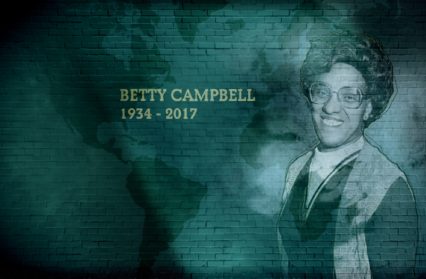Gary Raymond on the significance for Wales in these troubled times of the winning nominee of the Hidden Heroines poll.
The winner of the vote for the public statue in Cardiff’s Central Square, the first to be erected in Wales of a real Welsh woman, has been announced. From an inspiring field, Betty Campbell is a modern, progressive, inclusive, internationalist choice at a time when those attributes could not be more necessary to a nation and its people. If Wales itself, on the whole, is still to truly be any of those things, then a vote like this, with this result, should not be underestimated.
That Campbell was a woman of colour, who served her community, and therefore the country, with such distinction, and who has won a vote open to all people of Wales, is not something that will go unrecognised as the country tries to extricate itself from the ignominy of our Leave-leanings in the EU Referendum vote of 2016. Now that it has become quite clear that the Brexit vote was in reality a vote for white English nationalism, the fact that such an inspiring figure as Campbell will now greet every visitor and commuter as they exit the main railway station of Wales’ capital city is a sure statement that we are working to revoke that misguided sentiment.
But this statue, this statement, is much more than a rebuke to racism. Statues stand as public markers long after current affairs have moved to become chapters of history. The many statues of important men of Wales are, for many, pieces of street furniture now, and serve to symbolise little more than the longevity and pervasiveness of the patriarchy, no matter how noble and righteous the achievements of those men might have been. For future generations, Campbell’s statue will have changed the fabric of Wales, it will play a part in the subconscious of Wales’s children, and its children’s children. Glowering down at us all from now on, from Caernarfon to Tiger Bay, will no longer be the message that we work and move within the parameters of the structures white men built for us. This vote acknowledges the untruth of that history, it shouts to the world that Wales is a country that has a proud multicultural story. The statue will draw people to the life and achievements of Campbell, but also to the colonial and colonialist story of Wales, and perhaps even more importantly, will give people of all colours creeds and backgrounds a symbol of pride. For Campbell is a figure that most definitely was and should be a totem of inspiration to women, to people of colour, to minorities, to immigrants, to the working classes, but can also inspire all the people of Wales to push this country to be a strong, modern, progressive, inclusive nation.
I sit writing this having seen the announcement of Betty Campbell as winner of the Hidden Heroines vote from a hotel room in Kolkata, India, as I prepare to write about Welsh artists showcasing their work out here. The statement that this makes to the global community is staggeringly positive, and at a time when the world looks on at the UK, aghast, bemused at the self-immolation of Brexit, it is a statement that Wales is not, and will not continue to be, a country so easily associated with the worst types of English arrogance, entitlement, and blind, cruel, evil Empire nostalgia. Wales does not erect a statue only because we are proud of Betty Campbell, but because we are indebted to her, and I suspect our debt will only inflate in the years to come.
Gary Raymond is a novelist, critic, and Editor of Wales Arts Review.



 Enjoyed this article? Support our writers directly by buying them a coffee and clicking this link.
Enjoyed this article? Support our writers directly by buying them a coffee and clicking this link.







